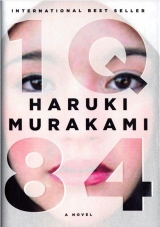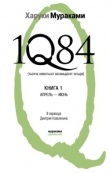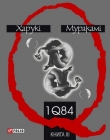
Текст книги "1q84"
Автор книги: Haruki Murakami
Жанр:
Современная проза
сообщить о нарушении
Текущая страница: 47 (всего у книги 81 страниц)
The boy suddenly falls ill a few days later and is sent to a distant sanatorium. The nature of his illness is not disclosed. In any case, Toru will surely never return to the school. He has been irretrievably lost.
The girl realizes that this is a message from the Little People. Apparently they cannot do anything to the girl, a maza, directly. What they can do instead is harm and even destroy the people around her. But they cannot do this to just anyone—they cannot touch her guardian, the painter, or his daughter, Kurumi. Instead they choose the weakest ones for their prey. They dragged the three black snakes from the depths of the boy’s mind and woke them from their slumber. By destroying the boy, they have sent a warning to the girl and are trying their best to bring her back to her dohta. “You, finally, are the one who caused this to happen,” they are telling her.
The girl returns to her loneliness. She stops going to school. Making friends with someone can only expose that person to danger. That is what it means to live beneath two moons. That is what she has learned.
The girl eventually makes up her mind and begins fashioning her own air chrysalis. She is able to do this. The Little People said that they had come to her world down a passageway from the place they belong. If that is the case, she herself should be able to go to that place down a passageway in the opposite direction. If she goes there, she can learn the secrets regarding why she is here and what the meaning of “maza” and “dohta” could be. She might also succeed in saving the lost Toru. The girl begins making a passageway. All she has to do is pluck threads from the air and weave a chrysalis. This will take time, but if she does take the time, she can do it.
Sometimes, however, she becomes unsure and confusion overtakes her. Am I really a maza? Couldn’t I have switched places somewhere with my dohta? The more she thinks about it, the less certain she becomes. How can I prove that I am the real me?
The story ends symbolically when the girl is opening the door of her passageway. It says nothing about what will happen beyond the door—probably because it has not happened yet.
Dohta, Aomame thought. Leader used that word before he died. He said that his own daughter had run away, leaving her dohta behind, in order to establish a force opposed to the Little People. It might have actually happened. And I am not the only one to see two moons.
Still, Aomame felt she could understand why this novella had gained such a wide readership. Although it was a story about the fantastical experiences of a girl placed in unusual circumstances, it also had something that called forth people’s natural sympathies. It probably aroused some subconscious something, which was why readers were pulled in and kept turning pages.
Tengo undoubtedly had contributed much to the book’s literary qualities, its vivid, precise descriptions, but she could not confine her admiration to that fact alone. She had to focus on the parts of the story where the Little People enter the action. For Aomame, this was a highly practical story—a virtual instruction manual—upon which hinged the life and death of actual people. She needed to gain concrete knowledge from it, to add whatever solidity and detail she could to her understanding of the world into which she had strayed.
Air Chrysalis was not just a wild fantasy dreamed up by a seventeen-year-old girl. The names may have been changed, but Aomame firmly believed that the majority of things depicted in it were unmistakable reality as experienced firsthand by the girl herself. Fuka-Eri had recorded those events from her own life as accurately as possible in order to reveal those hidden secrets to the world at large, to inform large numbers of people of the existence and the deeds of the Little People.
The dohta that the girl had left behind must have become a passageway for the Little People and guided them to Leader, the girl’s father, who was then transformed by them into a Receiver. They then drove the Akebono members, who were of no use to them, into a suicidal bloodbath, and transformed the remaining Sakigake group into a smart, militant, and xenophobic religious organization, which was probably the most comfortable and convenient environment for the Little People.
Aomame wondered if Fuka-Eri’s dohta had been able to survive for long without her maza. The Little People had said that it was virtually impossible for a dohta to go on living without her maza. And what about a maza? What was it like for her to live after having lost the shadow of her heart and mind?
After the girl escaped from Sakigake, the Little People had probably used the same process to make more new dohtas, their purpose being to widen and stabilize the passageway by which they came and went, like adding new lanes to a highway. This was how the dohtas became Perceivers for the Little People and played the role of shrine maidens. Tsubasa had been one of them. If Leader had sexual relations not with the girls’ actual mazas but with their other selves, their dohtas, then Leader’s expression—“ambiguous congress”—made sense. It also explained Tsubasa’s flat, depthless eyes and her near inability to speak. Aomame had no idea how or why the dohta, Tsubasa, had escaped from the religious organization, but she had almost certainly been put into an air chrysalis and “retrieved” to be taken back to her maza. The bloody killing of the dog had been a warning from the Little People, like what was done to Toru in the story.
The dohtas wanted to become pregnant with Leader’s child, but, lacking substance themselves, they were not menstruating. Still, according to Leader, their desire to become pregnant was intense. Why should that have been?
Aomame shook her head. There was still much that she did not understand.
Aomame wished that she could tell this to the dowager as soon as possible—that the man might actually have raped nothing more than the girls’ shadows; that they might not have had to kill him after all.
But even if she explained these things, it would not be easy for her to get the dowager to believe her. Aomame knew how the dowager would feel. The dowager—or any sane person—would have trouble accepting as fact this stuff about the Little People, mazas, dohtas, or air chrysalises. To sane people, these things would seem like nothing more than the kinds of fabrications that appear in fiction, no more real than the Queen of Hearts or the white rabbit with the watch in Alice in Wonderland.
But Aomame herself had actually seen two moons—the old one and the new one—hanging in the sky. She had actually been living under their light. She had felt their lopsided gravity in her skin. And with her own hands she had killed the man called Leader in a dark hotel room.
Aomame did not know what the Little People were hoping to accomplish by taking control of Sakigake. Perhaps they wanted things that transcended good and evil, but the young protagonist of Air Chrysalis intuitively recognized those things as not right, and she tried to strike back in her own way. Her vehicle was her story. Tengo became her partner to help get the story going. Tengo himself probably did not understand the meaning of what he was doing at that point, and he might not understand it even now.
In any case, the story called Air Chrysalis was the important key.
Everything started from this story.
But where do I fit into it?
From the moment I heard Janáček’s Sinfonietta and climbed down the escape stairs from the traffic jam on the Metropolitan Expressway, I was drawn into this world with two moons in the sky, into this enigma-filled world of 1Q84. What could it mean?
She closed her eyes and continued to think.
I have probably been drawn into the passageway of the “force opposed to the Little People” created by Fuka-Eri and Tengo. That force carried me into this side. What other explanation could there be? And the role I am playing in this story is by no means small. I may even be one of the central characters.
Aomame looked at her surroundings. In other words, I am in the story that Tengo set in motion. In a sense, I am inside him—inside his body, she realized. I am inside that shrine, so to speak.
I saw an old science fiction movie on television long ago. It was the story of a small group of scientists who shrank their bodies down to microscopic size, boarded a submarine-like vehicle (which had also been shrunk down), and entered their patient’s blood vessels, through which they gained entry to his brain in order to perform a complex operation that would have been impossible under ordinary circumstances. Maybe my situation is like that. I’m in Tengo’s blood and circulating through his body. I battled the white blood cells that attacked theinvading foreign body (me) as I headed for the root cause of the disease, and I must have succeeded in “deleting” that cause when I killed Leader at the Hotel Okura.
Aomame was able to warm herself somewhat with such thoughts. I carried out my assigned mission. It was a difficult mission, that is for sure, and I was afraid, but I carried it off coolly and flawlessly in the midst of all that thunder—and perhaps with Tengo looking on. She felt proud of what she had accomplished.
To continue with the blood analogy, I should soon be drawn into a vein, spent, having served my purpose. Before long, I will be expelled from the body. That is the rule by which the body’s system works—an inescapable destiny. But so what? I am inside Tengo now, enveloped by his warmth, guided by his heartbeat, guided by his logic and his rules, and perhaps by the very language he is writing. How marvelous to be inside him like this!
Still sitting on the floor, Aomame closed her eyes. She pressed her nose against the pages of the book, inhaling its smells—the smell of the paper, the smell of the ink. She quietly gave herself up to its flow, listening hard for the sound of Tengo’s heart.
This is the kingdom, she thought.
I am ready to die, anytime at all.
CHAPTER 20
Tengo
THE WALRUS AND THE MAD HATTER
No doubt about it: there were two moons.
One was the moon that had always been there, and the other was a far smaller, greenish moon, somewhat lopsided in shape, and much less bright. It looked like a poor, ugly, distantly related child that had been foisted on the family by unfortunate events and was welcomed by no one. But it was undeniably there, neither a phantom nor an optical illusion, hanging in space like other heavenly bodies, a solid mass with a clear-cut outline. Not a plane, not a blimp, not an artificial satellite, not a papier-mâché moon that someone made for fun. It was without a doubt a chunk of rock, having quietly, stubbornly settled on a position in the night sky, like a punctuation mark placed only after long deliberation or a mole bestowed by destiny.
Tengo stared at the new moon for a long time as if to challenge it, never averting his gaze, hardly even blinking. But no matter how long he kept his eyes locked on it, it refused to budge. It stayed hunkered down in its spot in the sky with silent, stonehearted tenacity.
Tengo unclenched his right fist and, almost unconsciously, gave his head a slight shake. Damn, it’s the same as in Air Chrysalis! A world with two moons hanging in the sky side by side. When a dohta is born, a second moon appears.
“That will be a sign. Watch the sky with great care,” one of the Little People said to the girl.
Tengo was the one who wrote those words. Following Komatsu’s advice, he had made his description of the new moon as concrete and detailed as possible. It was the part on which he had worked the hardest. The look of the new moon was almost entirely Tengo’s creation.
Komatsu had said, “Think of it this way, Tengo. Your readers have seen the sky with one moon in it any number of times, right? But I doubt they’ve seen a sky with two moons in it side by side. When you introduce things that most readers have never seen before into a piece of fiction, you have to describe them with as much precise detail as possible.”
It made a lot of sense.
Still looking up at the sky, Tengo shook his head again. The newly added moon was absolutely the same size and shape as the one for which he had invented a description. Even the figurative language that he had used fit this one almost perfectly.
This can’t be, Tengo thought. What kind of reality mimics fictional creations? “No, this can’t be,” he actually said aloud. Or tried to. His voice barely worked. His throat was parched, as if he had just run a very long distance. There’s no way this can be. That’s a fictional world, a world that does not exist in reality. It was a world in a fantastic story that Fuka-Eri had told Azami night after night and that Tengo himself had fleshed out.
Could this mean, then—Tengo asked himself—that this is the world of the novel? Could I have somehow left the real world and entered the world of Air Chrysalis like Alice falling down the rabbit hole? Or could the real world have been made over so as to match exactly the story of Air Chrysalis? Does this mean that the world that used to be—the familiar world with only one moon—no longer exists anywhere? And could the power of the Little People have something to do with this in one way or another?
He looked around, hoping for answers, but all that appeared before his eyes was the perfectly ordinary urban residential neighborhood. He could find nothing about it that seemed odd or unusual—no Queen of Hearts, no walrus, no Mad Hatter. There was nothing in his surroundings but an empty sandbox and swings, a mercury-vapor lamp emitting its sterile light, the spreading branches of a zelkova tree, a locked public toilet, a new six-story condo (only four units of which had lighted windows), a ward notice board, a red vending machine with a Coca-Cola logo, an illegally parked old-model green Volkswagen Golf, telephone poles and electric lines, and primary-color neon signs in the distance. The usual city noise, the usual lights. Tengo had been living here in Koenji for seven years. Not because he particularly liked it, but because he had just happened to find a cheap apartment that was not too far from the station. It was convenient for commuting, and moving somewhere else would have been too much trouble, so he had stayed on. But he at least knew the neighborhood inside and out and would have noticed any change immediately.
How long had there been more than one moon? Tengo could not be sure. Perhaps there had been two moons for years now and he simply hadn’t noticed. He had missed lots of things that way. He wasn’t much of a newspaper reader, and he never watched television. There were countless things that everybody knew but him. Perhaps something had occurred just recently to increase the number of moons to two. He wanted to ask someone, “Excuse me, this is a strange question, but how long have there been two moons? I just thought you might know.” But there was nobody there to ask—literally, not even a cat.
No, there was someone there. Nearby, someone was using a hammer to pound a nail into a wall. Bang bang bang. The sound kept up without a break, a very hard nail going into a very hard wall. Who could be pounding nails at a time like this? Puzzled, Tengo looked around, but he could see no wall, nor was there anyone pounding nails.
A moment later, Tengo realized that he was hearing the sound of his own heart. Spurred on by adrenaline, his heart was pumping surges of blood through his body. It pounded in his ears.
The sight of the two moons gave Tengo a slight dizzy feeling, as if it had put his nervous system out of balance. He sat down on top of the slide, leaning against the handrail, and closed his eyes, fighting the dizziness. He felt as if the force of gravity around him had subtly changed. Somewhere the tide was rising, and somewhere else the tide was receding. Their faces devoid of expression, people were moving back and forth between “insane” and “lunatic.”
In his dizziness, it suddenly occurred to Tengo that the image of his mother wearing a white slip had not attacked him for a very long time. He had almost forgotten that he had been tormented by that illusion for years. When could he have last seen it? He could not recall exactly, but it was probably around the time he started writing his new novel. For some unfathomable reason, his mother’s ghost had stopped haunting him from that point onward.
Instead, Tengo now sat on top of a slide in a playground in Koenji, looking at a pair of moons in the sky. An inscrutable new world silently surrounded him like lapping dark water. Perhaps a new trouble had chased out the old one. Perhaps the old, familiar riddle had been replaced by a fresh, new one. The thought came to Tengo without irony. Nor did he feel any need to complain about it. Whatever the composition of this new world might be, I surely have no choice but to accept it in silence. There’s no way to pick and choose. Even in the world that existed until now, there was no choice. It’s the same thing. And besides, he asked himself, even if I wanted to lodge a complaint, who is there for me to complain to?
The hard, dry sound of his heart continued, but the dizzy sensation was gradually subsiding. With his heart pounding in his ears, Tengo leaned his head against the handrail of the slide and looked at the two moons hanging in the Koenji sky. What a strange sight it was—a new world with a new moon. Everything was uncertain, and ultimately ambiguous. But there is one thing I can declare with certainty, Tengo thought: No matter what happens to me in the future, this view with two moons hanging up there side by side will never—ever—seem ordinary and obvious to me.
What kind of secret pact had Aomame concluded with the moon that time, Tengo wondered. And he recalled the deadly serious look in her eye as she stared at the moon in broad daylight. What could she have offered the moon?
And what is going to happen to me from now on?
At ten years old, as a frightened boy standing before the room’s big door, Tengo had wondered this again and again while Aomame continued to grip his hand in the empty classroom. Even now Tengo continued to wonder that same thing. He felt the same anxiety, the same fear, the same trembling. The door now was new and bigger. The moon was hanging there again, but this time there were two moons, not one.
Where could Aomame be?
Tengo scanned the area again from his perch on the slide, but nowhere could he find what he was hoping to discover. He spread out his left hand and struggled to find some clue, but there was nothing in his palm besides its natural deeply carved lines. In the flat light of the mercury-vapor lamp they looked like the canals on the surface of Mars, but they told him absolutely nothing. The most he could glean from this big hand was the fact that he had come a very long way since the age of ten—all the way to the top of this slide in a little Koenji playground where two moons were hanging in the sky.
Where could Aomame be? Tengo asked himself again. Where is she hiding?
“She might be very close by,” Fuka-Eri had said. “Within walking distance.”
Supposedly somewhere close by, could Aomame also see the two moons?
Yes, I’m sure she can, Tengo thought. He had no proof, of course, but he had a mysterious conviction that it must be true. She could see what he could see, without a doubt. He balled his left hand into a tight fist and pounded on the surface of the slide hard enough to hurt.
That is why it has to happen: we have to run into each other somewhere within walking distance of this place. Someone is after Aomame, and she’s hiding like a wounded cat. I don’t have much time to find her. But where could she be? Tengo had no idea.
“Ho ho,” called the keeper of the beat.
“Ho ho,” the other six joined in.
CHAPTER 21
Aomame
WHAT SHOULD I DO?
That night, Aomame stepped out onto the balcony in her slippers and gray jersey workout clothes to look at the moons. She was holding a cup of cocoa. It was the first time in a very long time that she felt like drinking cocoa, but the sight of a can of Van Houten cocoa in a kitchen cabinet had suddenly inspired her. Two moons—a big one and a little one—hung in the perfectly clear southwestern sky. Instead of sighing, she produced a tiny moan. A dohta had been born from an air chrysalis, and now there were two moons. 1984 had changed to 1Q84. The old world had vanished, and she could never get back to it.
Sitting on the balcony’s garden chair, taking little sips of the hot cocoa and looking at the two moons through narrowed eyes, Aomame tried to recall things from the old world. All she could bring back at the moment, however, was the potted rubber plant she had left in her apartment. Where could it be now? Was Tamaru looking after it as he had promised? Of course. There’s nothing to worry about, Aomame told herself: Tamaru is a man who keeps his word. He might kill you without hesitation if necessary, but even so, he would care for your rubber plant to the end.
But why am I so concerned about that rubber plant?
Aomame had barely thought about the thing until the day she left it behind in her apartment. It was nothing but a sad-looking rubber plant, its color pale and dull, its poor health obvious at a glance. It had carried an 1,800-yen price tag in a special sale, but the cashier had further dropped the price to 1,500 yen without being asked, and if Aomame had bargained it might have gotten cheaper still. It had obviously remained unsold for a long time, and all the way home she had regretted having bought it on impulse, not only because it was sad-looking, bulky, and hard to carry, but because it was a living thing.
That was the first time in her life that she had owned something alive. Whether a pet or a potted plant, she had never bought one or received one or found one. The rubber plant was her very first experience of living with a thing that had a life of its own. The moment she had seen the two little red goldfish in the living room and heard from the dowager that she had bought them for Tsubasa at a night stall in a street fair, Aomame had wanted to have her own fish—badly. She could hardly keep her eyes off them. Where had this desire come from all of a sudden? Perhaps she felt envious of Tsubasa. No one had ever bought Aomame anything at a street fair—or even taken her to one. Ardent members of the Society of Witnesses, faithful in every way to the teachings of the Bible, her parents had disdained and avoided all the secular world’s festivals.
And so Aomame had made up her mind to go to a discount store near the station in her Jiyugaoka neighborhood and buy a goldfish. If no one was going to buy her a goldfish and bowl, then she would do it herself. What’s wrong with that? she had thought. I’m a grown-up, I’m thirty years old, and I live in my own apartment. I’ve got bricks of money piled up in my safe-deposit box. I don’t have to ask anyone’s permission to buy myself a damned goldfish.
But when she went to the pet department and saw actual goldfish swimming in the tank, their lacy fins waving, Aomame felt incapable of buying one. She could not help but feel that paying money to take ownership of a living organism was inappropriate. It made her think, too, of her own young self. The goldfish was powerless, trapped in a small glass bowl, unable to go anywhere. This fact did not appear to bother the goldfish itself. It probably had nowhere it wanted to go. But to Aomame this was a matter of genuine concern.
She had felt none of this when she saw the two goldfish in the dowager’s living room. They had appeared to be enjoying themselves swimming in their glass bowl so elegantly, the summer light rippling through the water. Living with goldfish seemed like a wonderful thought. It should add a certain richness to her own life. But the sight of the goldfish in the pet department of the discount store by the station only made Aomame feel short of breath. No, it’s out of the question. I can’t possibly keep a goldfish.
What caught her eye at that point was the rubber plant, over in a corner of the store. It seemed to have been shoved into the least noticeable spot in the place, hiding like an abandoned orphan. Or at least it appeared so to Aomame. It was lacking in color and sheen, and its shape was out of kilter, but with hardly a thought in her head, she bought it—not because she liked it but because she had to buy it. And in fact, even after she brought it home and set it down, she hardly looked at it except on those rare occasions when she watered it.
Once she had left it behind, however, and realized that she would never see it again, Aomame couldn’t stop herself from worrying about the plant. She frowned hugely, the way she often did when she wanted to scream out loud in confusion, stretching every muscle in her face until she looked like a completely different person. When she had finished distorting her face into every possible angle, Aomame finally returned it to normal.
Why am I so concerned about that rubber plant?
. . .
In any case, I know for sure that Tamaru will treat the plant well. He is used to loving and caring for living things. Unlike me. He treats his dogs like second selves. He even uses his spare time to go through the dowager’s garden, inspecting her plants in great detail. When he was in the orphanage, he risked his own life to protect a younger boy with impaired abilities. I could never do anything like that, Aomame thought. I can’t afford to take responsibilities for others’ lives. It’s all I can do to bear the weight of my own life and my own loneliness.
“Loneliness” reminded Aomame of Ayumi.
Some man had handcuffed her to a bed in a love hotel, violently raped her, and strangled her to death with a bathrobe sash. As far as Aomame knew, the perpetrator had not been taken into custody. Ayumi had a family and colleagues, but she was lonely—so lonely that she had to experience such a horrible death. Still, I wasn’t there for her. She wanted something from me, that was certain. But I had my own secrets—and my own loneliness—that had to be protected. I could never share them with Ayumi. Why did she choose me, of all people, when there are so many others in this world?
Aomame closed her eyes and pictured the potted rubber plant that she had left in her empty apartment.
Why am I so concerned about that rubber plant?
Aomame spent the next several minutes crying. What’s wrong with me? she wondered, shaking her head. I’m crying too much these days. Crying was the last thing she wanted to do. But she couldn’t stop the tears. Her shoulders trembled. I’ve got nothing left. Anything of value I ever possessed has disappeared, one thing after another. Everything is gone—except for the warmth of my memory of Tengo.
I’ve got to stop this crying, Aomame told herself. Here I am, inside of Tengo, like the scientists in Fantastic Voyage. Yes, that’s it! The movie’s title was Fantastic Voyage. Satisfied that she had recalled the title, Aomame calmed down and stopped crying. No matter how many tears I shed, it’s not going to solve anything. I’ve got to go back to being the cool, tough Aomame.
Who wants that to happen?
I want that to happen.
She looked at her surroundings. There were still two moons in the sky.
“That will be a sign. Watch the sky with great care,” one of the Little People, the small-voiced one, had said.
“Ho ho,” said the keeper of the beat.
. . .
Just then Aomame noticed something: she was not the only person looking up at the moons. She could see a young man in the playground across the street. He was sitting on top of the slide and looking in the same direction that she was. He is seeing two moons, just like me, she knew intuitively. No mistake, he is looking at what I am looking at. He can tell: there are two moons in this world. But Leader had said that not everyone living in this world could see both moons.
There was no room for doubt: this large young man was looking at a pair of moons in the sky. I’d bet anything on that. I can tell. He’s sitting there, looking at the big, yellow moon and the small, lopsided, greenish mossy-colored moon. He appears to be thinking hard about their meaning. Could he too have drifted into 1Q84? Maybe he is confused, unable to grasp the meaning of this new world. Yes, that must be it. That must be why he had to climb to the top of the slide in this playground at night, staring at the moons all alone, mentally listing all the possibilities, all the hypotheses he could think of, and examining them in detail.
But no, that might not be it at all. He could be working for Sakigake. He could be here looking for me.
The thought set Aomame’s heart racing. Her right hand unconsciously reached for the automatic pistol in her waistband, tightening on its hard grip.
It was impossible, though, to find any sense of tension or urgency in the man on the slide, and there was nothing about him that suggested violence. He was just sitting up there alone, his head against the handrail, looking straight up at the moons in the sky, absorbed in his own thoughts. Aomame was on her third-story balcony, and he was down below. She sat in the garden chair, looking down at the man through the gap between the balcony’s opaque plastic screen and the metal railing. Even if he were to look up toward Aomame, he would probably not be able to see her, but in any case the man appeared to be completely engrossed, staring at the sky without the slightest sense that someone might be staring at him.
Aomame calmed herself down and quietly released the breath that she was holding in. She relaxed the tension in her fingers and took her hand from the pistol. Maintaining her position, she continued to observe the man. From her vantage point, she could only see his profile. The playground’s mercury-vapor lamp cast its bright light on him from above. He was a tall man with broad shoulders. He had a stiff-looking head of hair, cut short, and he wore a long-sleeved T-shirt, its sleeves rolled up to his elbows. Not exactly handsome, but he had good, solid features, and the shape of his head was not bad. If he were a little older and his hair thinning, he would be quite nice-looking.





